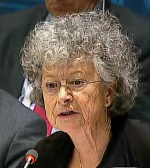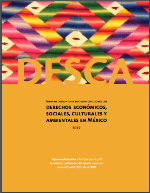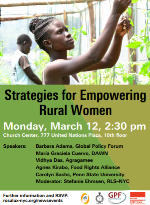Social Watch news
Published on Tue, 2018-03-20 17:39
Most farms in developing and least developed countries are small, generally plots of less than two hectares of land. Smallholder farmers manage over 80% of the world’s estimated 500 million small farms and provide over 80% of the food consumed in Asia and sub-Saharan Africa, contributing significantly to poverty reduction and food security. As much as 75% of global seed diversity in staple food crops is held and actively used by smallholder farms. However, despite their vital role in the global agricultural community, the participation and priorities of smallholder farmers – most of whom are women – are often neglected. Effective mechanisms giving smallholder farmers a voice in policymaking are imperative to address their needs and interests, to promote the conservation and sustainable use of plant genetic resources and more broadly, to ensure food security. |
Published on Fri, 2018-03-09 19:19
"Civil society organizations are natural allies of the United Nations, but the partnership modality is not the primary way for civil society to engage with the UN" argued Barbara Adams at a panel discussion on "Strengthening partnerships and stakeholder engagement" that took place in the framework of the ECOSOC Operational Activities for Development on 27 February 2018. From a CSO perspective, she added, the primary way of leveraging resources for the Sustainable Development Goals is fair and progressive taxation. |
Published on Fri, 2018-03-09 00:00
Morocco is planning to build Africa's tallest building and a bullet train between its main cities, but local Social Watch groups argue that the people need instead basic infrastructure for clean water, health services and education. |
Published on Thu, 2018-03-08 17:58
In the more than 11 years since Mexico’s last periodic review by the UN Committee on Economic, Social, and Cultural Rights, international scrutiny of the human rights situation in Mexico has centered largely on civil and political rights. However, the human rights crisis in our country also includes a multiplicity of economic, social, cultural, and environmental (“ESC”) rights violations committed by state and non-state actors, through acts and omissions that remain in impunity. In this context, the undersigned civil society organizations and networks submit this Alternative Report to the Committee with the aim of contributing to its important and urgent work in the supervision of the situation of ESC rights in Mexico. The report reflects our collective experience of many years in the investigation, documentation and defense of these rights, and seeks to clarify the current situation in the country, as well as identify key obstacles, setbacks, limitations, and challenges for the full enjoyment of ESC rights. |
Published on Sun, 2018-03-04 19:12
This public panel will discuss the multiple roles of rural women and girls for enhancing food sovereignty, preserving biodiversity, reducing inequalities, and combating climate change. The presentations will affirm the importance of engaging women in policy-making around more equitable and sustainable production and consumption. Panelists will offer perspectives from the local level, addressing challenges such as intellectual property rights and land ownership for small-scale women farmers. We will also discuss the opportunities and shortcomings of a human rights approach and global advocacy efforts to increasing women's participation in decision-making to tackle poverty, malnutrition, and environmental degradation. |
Published on Sat, 2018-03-03 08:57
The just released Canadian federal budget for 2018 takes some positive steps forward on gender equality and science funding, but comes up short on the bold policy moves that will make a real difference —universal child care, pharmacare, health care, and tax fairness. The government promised their citizens a budget guided by gender analysis this year, and in many ways it delivered: pay equity legislation for the public sector, ‘use it or lose it’ second parent leave, a long-awaited increase in funding to women’s organizations, and additional investments for addressing workplace harassment and funding to rape crisis centres. |
Published on Fri, 2018-03-02 14:25
An interview with Barbara Adams, on the problem of private finance within the UN development system, and the need for civil society action in response to these growing trends. Adams speaks about the United Nations' turn to the corporate sector and the trend for multi-stakeholder partnerships. This has been reinforced by the 2030 Agenda, and the push for its implementation and achievement of the SDGs. The accompanying policy influence, programme distortions, undermining of the 2030 Agenda and ability to achieve the Sustainable Development Goals have, however, not been adequately addressed. |
Published on Tue, 2018-02-06 14:00
While real GDP growth for the Least Developed Countries (LDCs) as a group is forecast to strengthen somewhat to 5 per cent in 2017 and 5.4 per cent in 2018, the modest improvements in the international context fall short of what would be needed to spur growth and structural transformation in the LDCs. This is one of the main conclusions of the United Nations Conference on Trade and Development (UNCTAD) in a new report titled "Selected Sustainable Development Trends in the Least Developed Countries 2018". |
Published on Thu, 2018-02-01 00:00
Social Watch invites you to participate in our renewed collective effort to make governments accountable for the ambitious promises they made us. The 2030 Agenda, adopted in 2015 at the highest level by the United Nations encapsulates in 17 Sustainable Development Goals a vision of sustainable development without poverty, with less inequalities and more social and gender justice while respecting planetary boundaries. The Social Watch network has contributed to making those commitments accountable to the peoples by publishing and bringing to the consideration of the United Nations national reports from 47 countries and highlighting their findings in the global Spotlight reports. The High Level Political Forum (HLPF) is the United Nations body mandated by the 2030 Agenda to have a “central role in overseeing a network of follow-up and review processes at the global level.” The HLPF will meet in New York, next July 9 to 18 for an in-depth review of Goals 6, 7, 11, 12, 15 (the so-called “environmental goals”) and SDG17 on implementation. The theme will be "Transformation towards sustainable and resilient societies". Forty-eight countries will present their national reviews and there will be regional preparatory meetings in March and April and issue-specific conferences between February and June. There are many different ways and opportunities for national groups and coalitions to contribute. See more detail on how Social Watch offers some opportunities to participate in the guidelines. At the Social Watch secretariat we are looking forward to hear more about your plans and help put you in touch with others doing similar efforts. |
Published on Mon, 2018-01-15 16:03
Lessons from the WHO experience |
SUSCRIBE TO OUR NEWSLETTER










